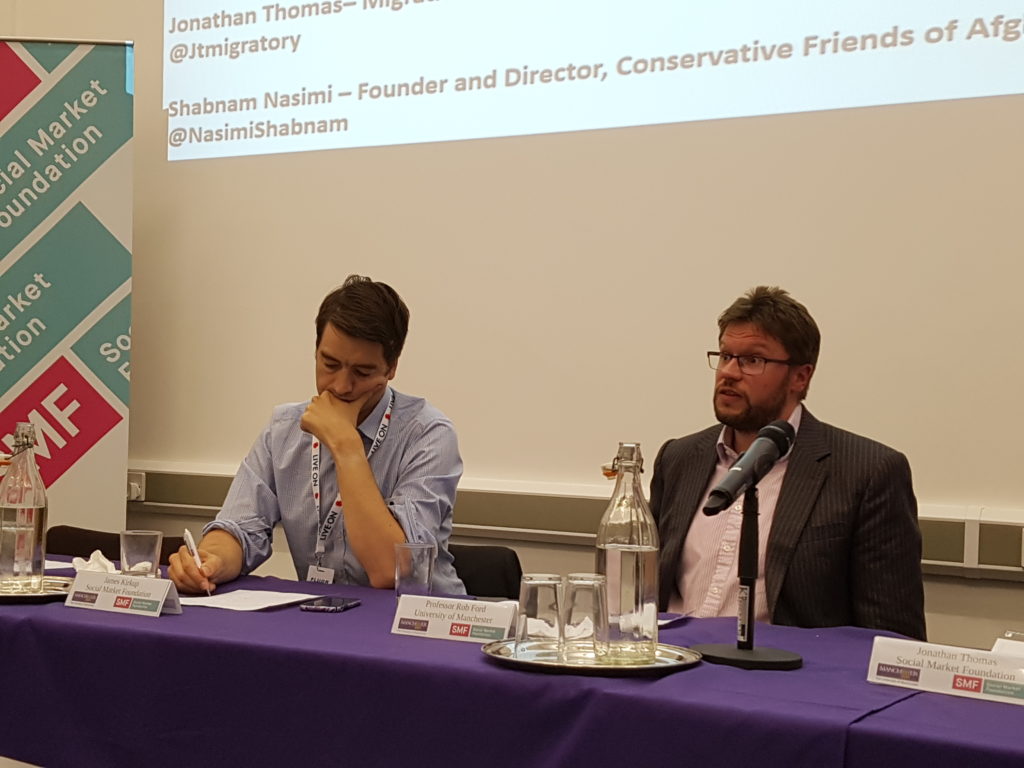
In partnership: Policy@Manchester.
Immigration policy remains high on the national agenda – but with the electorate’s views shifting on the subject, does the Conservative stance on immigration need a rethink? This event was held in partnership with Policy@Manchester, part of Manchester University.
Speakers:
Professor Rob Ford, Professor of Political Science, University of Manchester
Jonathan Thomas, Migration Researcher, Social Market Foundation
Chair: James Kirkup, Director, Social Market Foundation
James Kirkup kicked off the event by explaining the SMF’s objectives on immigration policy: “We are here to engage people of all parties and none and encourage them to take a realistic, positive view of immigration.”
The starting point for the debate was political narratives about immigration, because such narratives drive detailed policy. Changing policy needs a change in the national story on immigration.

Rob Ford said he agreed that the Conservative Party needs to change its thinking and tone on immigration, since its stance is increasingly at odds with wider public opinion.
The Conservative Party have historically had a clear and very well-defined stance, which could be summed up with the phrase ‘tight immigration control was necessary for good race relations.’ For the Tories, immigration has been seen as a source of social problems that requires to be solved through government control.
This however became a less compelling story. Not just because it failed, but because it was no longer a message that resonated with electorate. It is clear that the rhetoric around immigration is changing and that makes this message less appealing in terms of the electorate as a whole.
This has become a less compelling story. Partly that is because the Conservatives lost public trust by failing to deliver on the “tens of thousands” promise earlier in this decade. But also, the mess no longer resonates with much of the electorate. As the number of voters with a university education and/or a minority ethnic background rises, a “tough” immigration message will constrain the party’s electoral appeal. There is also a reputational impact of immigration policy. It sends a message that the Conservative Party is inward-looking.
There is also a reputational impact of immigration policy. It sends a message that the Conservative Party is inward-looking.

Ford said a better message for the Conservative Party would be to be welcoming, unless there is a reason not to be welcoming.
Jonathan Thomas noted the UK did not become a net immigration country until 1979. Openness, flexibility, economy and drive for growth is a condition that has and continues to bring an increase in immigration. The most celebrated period of Conservative rule had made Britain an attractive place for international migrants. As a party supportive of business and flexible labour markets, Conservatives have seen the economic case for immigration even when making the social argument against it.
Conservatives have seen the economic case for immigration even when making the social argument against it. The result of trying to please everyone is that the Conservative Party ends up “holding the door with one hand while making rude gestures with another.”
He thought the UK’s position on being able to shape the narrative on immigration is encouraging: it has more scope for change in the immigration story than most other nations and this opportunity should be grabbed. As well as rethinking immigration, Conservatives should think more about integration: how should immigrants be included in the patriotic vision of Britain that they like to promote?
Ford concluded by highlighting the work of Eric Kauffman at Birkbeck University, which shows that the way in which politicians talk about immigration has a significant impact on public opinion: emphasising integration encourages acceptance.
To watch the event in full:
